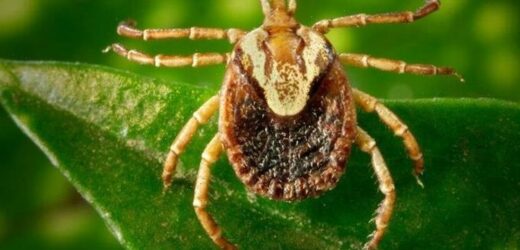Monster mosquitoes invade US after Hurricane Florence
We use your sign-up to provide content in ways you’ve consented to and to improve our understanding of you. This may include adverts from us and 3rd parties based on our understanding. You can unsubscribe at any time. More info
The CCHF is a widespread disease caused by a tick-borne virus and has a mortality rate of around 30 percent. It is endemic in Africa, the Balkans, the Middle East and Asian countries south of the 50th parallel north. A British woman was recently diagnosed with the virus at Cambridge University Hospitals NHS Foundation Trust, after returning to the UK from Central Asia.
She is now receiving specialist treatment from medial experts at the Royal Free Hospital London.
Dr Sir Michael Jacobs, consultant in infectious diseases at the hospital, sought to reassure the public that the situation was under control.
He said: “The Royal Free Hospital is a specialist centre for treating patients with viral infections such as CCHF.
“Our high level isolation unit is run by an expert team of doctors, nurses, therapists and laboratory staff and is designed to ensure we can safely treat patients with these kind of infections.”
There have been two previous cases of CCHF imported to the UK – one in 2012 and the other in 2014.
On both occasions the virus was contained and did not spread to the wider population.


Dr Susan Hopkins, Chief Medical Advisor at the UK Health Security Agency (UKHSA) insisted that the overall risk to the public was “low”.
Later the UKHSA said on their website no further cases of the virus had been detected.
They wrote: “The UK Health Security Agency can confirm that the monitoring periods, for contacts of the Crimean-Congo haemorrhagic fever case who required active monitoring, have now been completed.
“No further cases have been identified.
“We would like to thank our partners in the NHS for their prompt action and all of the contacts for their cooperation.”


The virus is carried by Hyalomma ticks and has an incubation period of between one to three days, with the onset of symptoms often occurring rapidly.
These include fever, muscle ache, dizziness, headache and sensitivity to light.
Patients can also suffer from nausea, vomiting and diarrhoea, as well as abdominal pain.
A report carried out by the Human Animal Infections and Risk Surveillance group (HAIRS) for Public Health England last April assessed the probability of contracting the CCHF virus in the UK as “very low”.
They said: “No locally acquired human cases of CCHF have been reported in the UK.
DON’T MISS
Peter Shilton health: Footballer on health effects of addiction [REVEAL]
Dawn French fans wish her luck ahead of harrowing dental procedure [SPOTLIGHT]
Covid surge peaks at one in 13 record level [NEWS]

“Nor has the CCHF virus been found in any potential tick vector species found within the UK.”
However, they did note that an adult male Hyalomma rufipes tick was detected in the UK in September 2018 on a horse with no history of travel.
They also said an adult male Hyalomma marginatum tick was found on a human at a bird reserve in Norfolk in the same year.
Spain reported its first case of human to human transmission of the deadly virus in 2016.
Ticks in Spain had first been found to carry CCHF in 2010 and between 2016 and March 2021, 7 human cases of CCHF infection have been reported.
Source: Read Full Article


